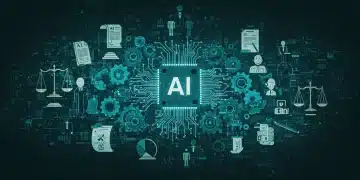Ethical AI frameworks 2025: shaping the future responsibly

Ethical AI frameworks ensure that AI systems are developed responsibly, focusing on accountability, transparency, and fairness to benefit society while minimizing biases and enhancing trust in technology.
Ethical AI frameworks 2025 are crucial in shaping a responsible technology landscape. As AI continues to evolve, how will these frameworks ensure fairness and transparency? Let’s dive into the essentials.
Understanding ethical AI frameworks
Understanding ethical AI frameworks is essential as we navigate the complexities of artificial intelligence. These frameworks provide guidelines for creating AI systems that are fair, transparent, and accountable. They ensure that AI technologies are used responsibly and ethically, reflecting societal values.
Key Components of Ethical AI Frameworks
There are several critical components that define ethical AI frameworks. These components help in establishing a strong foundation for AI development.
- Transparency: AI systems should be understandable to all stakeholders.
- Fairness: The algorithms must be designed to avoid bias and discrimination.
- Accountability: Developers must take responsibility for their AI systems.
- Privacy: Respecting user data and ensuring confidentiality is crucial.
As technology evolves, the need for robust ethical guidelines intensifies. Integrating ethics into AI design is not just about compliance; it’s about fostering trust. For example, organizations that prioritize ethical standards often see an increase in user confidence. This can lead to more widespread adoption of AI technologies.
The Role of Stakeholders
Various stakeholders play a vital role in shaping ethical AI frameworks. These include governments, businesses, researchers, and the public. Each group has unique perspectives that contribute to more comprehensive guidelines. Collaborative efforts can lead to more universally accepted principles, enhancing the overall social impact of AI.
Ultimately, ethical AI frameworks serve as a compass for navigating the challenges and opportunities of emerging technologies. They encourage responsible innovation that prioritizes human values, ensuring that we harness the potential of AI for the greater good.
Key principles guiding ethical AI
The key principles guiding ethical AI are fundamental in developing AI systems that prioritize human values. These principles help ensure that technology serves society positively and responsibly.
Principle of Beneficence
This principle emphasizes that AI should do good. It encourages designers to create systems that aim to enhance well-being and promote positive outcomes. An AI system should not only solve problems but should also improve the overall quality of life.
Principle of Non-Maleficence
This principle highlights the need to avoid harm. Developers must consider the potential risks and negative impacts of AI technologies. Harm can come from biased algorithms or invasion of privacy, so it’s essential to mitigate these risks effectively.
- Ethical Considerations: Understanding potential consequences is crucial for ethical development.
- Impact Assessment: Regular assessments can help identify harms before deployment.
- Responsibility: Developers must take ownership of their AI’s impact on society.
Another important principle is fairness. AI systems should be designed to treat all individuals equitably. This involves creating algorithms that do not inadvertently discriminate based on race, gender, or socio-economic status. Regular audits can help uncover any biases in AI behavior.
Transparency in AI Development
Transparency is a vital principle that encourages openness in the development process. Stakeholders should understand how AI systems make decisions. Clear documentation and explainable AI can foster greater trust among users.
By following these key principles, organizations can create ethical AI systems that not only comply with regulations but also promote social good. These principles are not exhaustive, but they serve as a solid foundation for responsible AI innovation.
Challenges in implementing ethical AI

Implementing ethical AI comes with several challenges that organizations must address carefully. These challenges can affect how AI systems are developed and integrated into society.
Addressing Bias in Data
One significant challenge is the presence of bias in the data used to train AI systems. When datasets reflect societal prejudices, the resulting models may perpetuate or even amplify these biases. This can lead to unfair outcomes, especially for marginalized groups.
- Data Diversity: Ensuring datasets represent a wide range of demographics.
- Continuous Monitoring: Regularly assessing AI models for biased performance.
- Transparency: Making data sources clear to all stakeholders.
Another challenge lies in ensuring transparency in AI processes. Many AI algorithms operate as “black boxes,” meaning their decision-making processes are often hidden. Without transparency, users cannot understand how decisions are made. This lack of clarity can undermine trust in AI technologies.
Regulatory Compliance
Organizations also face the challenge of navigating regulatory requirements that vary by region. Different countries have different laws regarding data privacy and ethical practices. Keeping up with these regulations can be complex and require ongoing adjustments to systems.
Integrating stakeholder feedback is essential yet challenging as well. Engaging diverse voices in AI development can ensure that various perspectives are considered. However, it can be difficult to reach consensus among multiple stakeholders, which may slow down progress.
Additionally, resource constraints, such as funding and skilled personnel, can hinder the implementation of ethical practices. Organizations must find ways to allocate adequate resources to ensure ethical guidelines are followed during AI development.
By addressing these challenges, organizations can create a framework for ethical AI that fosters fairness, transparency, and accountability. Overcoming these hurdles is vital to building trust and enhancing the positive impact of AI utilization.
Case studies of successful ethical AI
Case studies of successful ethical AI implementations provide valuable insights into how organizations can effectively integrate ethical principles into their AI systems. These examples showcase real-world applications and demonstrate the positive impact of ethical guidelines on technology.
Healthcare Innovations
In the healthcare sector, many organizations have adopted AI to improve patient outcomes while adhering to ethical standards. For instance, an AI-driven system used by a hospital analyzes patient data to suggest personalized treatment plans, ensuring that it respects patient privacy and consent.
- Data Protection: This system emphasizes data security and patient confidentiality.
- Bias Reduction: By using diverse datasets, the AI minimizes the risk of biased treatment recommendations.
- Community Engagement: Hospitals involve patients and communities in discussions about AI use.
This approach not only enhances care but also builds trust among patients, illustrating how ethical AI can lead to better health outcomes.
Financial Services and Fair Lending
Another notable case is in the financial sector, where an AI system aids in fair lending practices. A leading bank implemented an AI platform that evaluates loan applications while eliminating biases based on race or gender. This system is regularly audited to ensure compliance with ethical standards.
The bank actively engages with community organizations to review its lending practices, ensuring that diverse perspectives shape its AI functionalities. Regular feedback loops help identify any potential issues, reinforcing transparency and accountability.
Through these case studies, it is clear that ethical considerations can enhance the effectiveness of AI in various fields. Organizations that prioritize ethics not only comply with regulations but also gain a competitive edge by fostering trust and loyalty among stakeholders.
Future trends in ethical AI frameworks
Future trends in ethical AI frameworks will shape how technology interacts with society. As AI continues to evolve, these frameworks must adapt to new challenges and opportunities.
Increased Focus on Accountability
One important trend is the growing emphasis on accountability in AI systems. Developers will be required to take responsibility for their algorithms and their impacts on society. This might involve new regulatory requirements and guidelines that ensure organizations are held accountable for their AI decisions.
- Regular Audits: Organizations may need to conduct regular audits of their AI systems to ensure compliance with ethical standards.
- Clear Documentation: Maintaining thorough documentation of AI development processes can improve accountability.
- Stakeholder Engagement: Engaging diverse stakeholders will be vital in refining responsible practices.
Another trend is the integration of AI ethics into education. As the demand for AI professionals grows, educational institutions will likely focus more on teaching ethical frameworks. Students will learn not only how to build AI systems but also how to ensure they are ethically sound.
Emphasis on Transparency
Transparency will also play a significant role in the future of ethical AI. As AI applications become more complex, users will demand greater insight into how decisions are made. This push for transparency may lead to the development of explainable AI models that give users clear information about the reasoning behind AI decisions.
Moreover, there will be an increased demand for collaboration between organizations, governments, and communities. This collaboration can help create standardized ethical guidelines that promote fairness and inclusivity in AI. By working together, stakeholders can ensure that emerging AI technologies align with societal values and needs.
As technology continues to advance, we can expect ethical AI frameworks to evolve. These frameworks will need to address unique challenges posed by new technologies while prioritizing human well-being and societal good. Ultimately, the future of ethical AI will depend on how effectively we can adapt these frameworks to the changing landscape.
FAQ – Questions about Ethical AI Frameworks
What are ethical AI frameworks?
Ethical AI frameworks are guidelines that help developers create AI systems that are fair, transparent, and accountable.
Why is accountability important in AI?
Accountability ensures that organizations take responsibility for their AI systems and their impacts on society, fostering trust.
How can transparency improve AI systems?
Transparency allows users to understand how AI systems make decisions, which builds trust and helps reduce biases.
What roles do education and training play in ethical AI?
Education and training equip future professionals with knowledge of ethical practices, ensuring they prioritize ethics in AI development.





